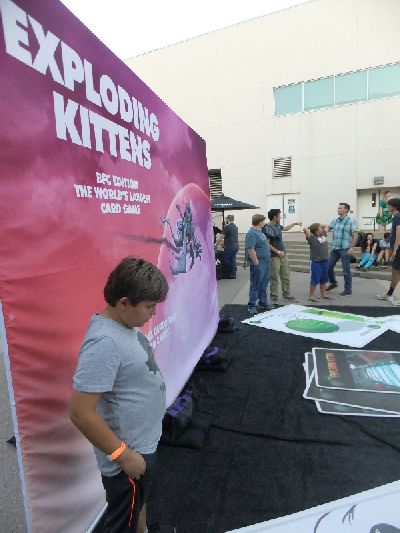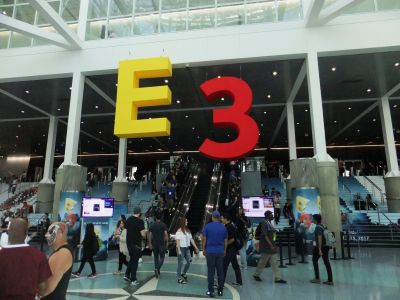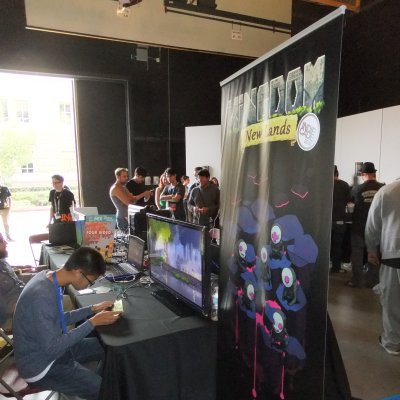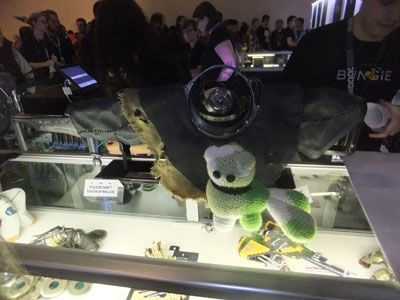Indiecade 2017

Indiecade moved again this year to Little Tokyo – The open areas and exhibition halls of the Japanese American National Museum are certainly well suited for the type of event it is and with the proximity to restaurants and shops it was a big improvement over last year in terms of space. Perhaps not quite as good as it was back in Culver City, but more suitable than UCLA for sure.
Another change was the notable absence of Sony, Nintendo and Microsoft – I don’t know how much this was a desire from the festival organizers to go further into their niche and how much was the console manufacturers pulling out, but their presence always brought with it a series of more traditional independent games that served to ground the festival in something a little bit more accessible. This was perhaps not strictly necessary for a festival that has always strived to highlight the innovative and esoteric, but Indiecade does feel a lot smaller without them and it was hard to find enough things to do to spend more than a couple of hours there.
That said, Indiecade is always a good time and this year had some of the past year’s really strong titles on display – notably OneShot and Dream Daddy from my own favorites – and I was delighted by Penny Blue Finds a Clue. I also had the chance to meet an old friend who had the more traditional game Yoku’s Island Express on display, a gorgeous game with an interesting twist on the exploration-platforming genre.
E3 2017

Kind of late to the party, admittedly, as E3 was more than a week ago now. I’m not really interested in publicly musing about the announcements themselves – all of them are online for anyone to see and make up their own mind about.
The show itself has always been a weird thing – a joint press event for the gaming media from before when the individual publishers had enough pull to get any attention, it fell off the map when the publishers did get big enough to put on their own shows. It then came back, and it’s never been entirely clear why – it seems some big actors agreed with this and simply neglected to have any E3 presence whatsoever. Last year had EA drop out and hold their own event open to their fans, this left the show floors fairly empty and in 2017 E3 was opened to the public. To be fair, it was kind of always open to the public if you had a thousand dollars and could be bothered to set up a blog, but this year the pretense was dropped and the price was dropped to something more akin to what you’d pay to attend a convention.
That said, I like E3. For all of its superficial glamour and questionable marketing practices, it was always a good time to walk around and get some hands-on time with the upcoming selection of games. It was something of a limited preview and I never understood why I got invited in the first place – to some extent neither did others, and a lot of E3 remains hidden behind closed doors, available only to the media. It used to be that even if the bigger games had long lines if you wanted to try, there were always free stations for some of the less highly publicized stuff you could try at any time. Not so this year, as the amount of people guaranteed that no game could be played if you weren’t prepared to wait for an hour.
So I kind of miss what E3 was, but I know full well it made no sense for it to remain exclusive.
Indiecade

One of the largest advantages of living in greater Los Angeles is that going to Indiecade every year is not that big of a committment. As festivals go, it has a lot more experimental and esoteric content which makes it one of the most inspiring game-related events to attend, but it also means most games are not going to be relevant for everybody and being a AAA developer most of the presentations aren’t really relevant to me. So being able to swing by the festival for a day without investing more than a couple of hours on the freeway is a huge plus.
This year, Indiecade moved from Culver City to USC – I don’t know what effect this had on the conference part, put it did make the festival part worse. A couple of the spaces were cool, but overall it was difficult to get a good sense of how big it was and where the games were, everything was squared away which made it feel less alive and full of passionate people and introduced lines to even get into the spaces to see the games. Night games were made notably worse as well, much smaller than previous years and with far fewer social spaces and opportunities to partake in arcade-style challenges. Also, not having it in Culver City made getting food a large problem. So that was a bit of a bummer.
Still, it is still Indiecade and there were tons of great games – some that were great right there and then, and others that were maybe not best presented in a short burst at a festival but whose potential and originality clearly shone through. I enjoyed Skytorn, a somewhat traditional take on the metroidvania genre, but it had some really fresh enemy mechanics to keep it interesting and promises to have more tricks up its sleeve. Kingdom: New Lands was a simplified version of a sidescrolling RTS that worked remarkably well, and I think my favorite game of the show was the Shakespearian tragedy Elsinore. It’s an amazing setting for a time-loop mystery plot that is executed very well, and I can’t wait to play it.
PAX West 2016

I used to write something about the various events going on in the games industry, but when I actually started partaking I stopped. In a few cases that is warranted – when judging some competition, for instance, it’s difficult to be 100% ethical when writing publicly about it – but other than that it seems good to reflect on their value.
So, PAX West. Also, PAX Dev. I’ll start with that, since it came first.
I’m not entirely sold on the concept of PAX Dev – that they disallow journalists or recording in order to allow presenters to speak more freely. Even if we could rely on people to keep their mouths shut, there is no vetting process of attendees so you have no guarantee whatsoever that the people who should not hear what you have to say will not be in the audience – this being the case, presenters stuck to topics they could have just as well given at GDC or Indiecade. The big drawback, of course, is that there is no way to watch recorded presentations after the conference.
As conferences go, there were a some really good presentations and some that were mostly rehashes of old content or thinly-veiled marketing ploys. Not quite the quality of GDC but good in terms of value for the cost – especially if you already live in Seattle. And they do get bonus points for having tables in all their rooms.
PAX West itself was a weird beast – the stores and panels felt like they were taken from comic con, the boardgames would have felt right at home at a PnP/boardgame convention, the AAA studios had smaller versions of their setups from E3 and the independent games were laid out in much the same way as you’d find them at Indiecade. But the variety works really well – for all of those shows, attending a single day is usually more than enough for me but with PAX I was still finding more things to do for the entirety of the show. I suppose part of that is the lines – like any consumer show, the lines are long to just about everything. Also, the panels are going to be interesting to the fans rather than educational. But when it comes down to it, PAX is a show that is more than the sum of its parts.
My favorite games of the expo included Owlboy, Pit People, Celeste, Enter the Gungeon and Fossil Echo. Not going to get into why for the unreleased ones just yet, but Enter the Gungeon had really tight controls and interesting varieties of weapons and enemies that made it fun to play, it also was very visceral and satisfying and clean art with consistent theming. I don’t play a lot of roguelikes since I like finite experiences, but I will make an exception in this case.
I don’t like review scores either

It should be said that I am probably not the target demographic for game reviewers; I usually play games from recommendation or in some cases games that are too obscure to be reviewed in the first place. That being said, I wonder who actually does benefit from them. I wanted to say something about it after reading the a review on Quarter to Three, considering when that review was posted most of the commenters had not played the game but still decided to pour their hate over said review.
This of course doesn’t apply to all studios and certainly not all publications, but there has been a lack of integrity in the relationships between the game press and the publishers/developers. Write nice, long previews and give us magazine covers and you may come to the closed preview. Give us a low score and we might not even send you a review copy next time. There are plenty of examples of people on all sides acting irresponsibly – lately the practice of publishers holding developers’ bonuses hostage to aggregate ratings have been hot in the rumormill. This is not quite as absurd as it should be, but I’ll get to that in a bit – what is more absurd is how both developers and gamers are blaming the gaming press for indirectly lowering developer salaries this way.
I do enjoy comparing viewpoints so reading reviews is always very rewarding to me, I mostly take issue with the scoring system. Even the idea of quantizing quality is not in itself bad, but since the dawn of games reviewing we have focused on breaking down a game into its functional components – art, sound, design etc. – and tallied up scores in an attempt to objectively determine if a game is good. I do agree that this might be a good way to judge the performance of the individual developers (hence it not being so absurd to use it to determine bonus payments), but at best it gives you very basic information about how well the game succeeded with its ambitions, not if the reviewer enjoyed it.
During the last few years games as a medium have diversified immensely, and even among traditional games the independent scene has made sure we get interesting new experiences. The fears from the early 2000s, that the evolution of games had essentially devolved into a tech race rather than a quest for innovation, are mostly moot now. Looking at a game as anything but a holistic, subjective experience has never been particularly helpful, but now it is also becoming very hard to do.
What Amanita Design are up to…
…Apparently the studio behind Samorost and Machinarium are making another game! A short one, but still cause for joy.
In addition to that, they have sent out word that they also started working on a third Samorost game and that unlike the first two this is to be a full-length game. Very good news indeed, but it is probably still ways off (at this point there seems to be no official announcement either).
More on Fez

Gamasutra offers up an interesting piece of news where Phil Fish talks about what has taken so long during the development of Fez. He mentions reductionism, not really a new concept in game design (I like to point to Jonathan Blow’s original thoughts about Braid) but he approaches it in a slightly different manner.
Which seems to be common for Polytron, taking a slightly different stance and reaching new conclusions. Phil Fish himself has been more of an organizational figure than a well-known developer in the indie scene, but the fact that whatever he makes will come from a different approach to a traditional formula makes the game interesting.
On Starbreeze

So apparently I missed this completely; 1up picks apart the history of Starbreeze Studios.
Most of it is personal opinions on verified facts rather than any real secrets, but still an interesting read. I have little further to say other than to add my voice to the choir; when I left Starbreeze it was a very different company than the 30-people strong outfit I joined in 2005. It goes for the entire games industry, really. We were still just discovering MMORPGs and the large scale indie movement had barely even started. The entire social games movement was not even thought of – we did not even have achievements or anything to share our mostly singleplayer experiences. Even if the particular change that happened to Starbreeze was up to a few specific companies and individuals, I think that the change itself was inevitable.
Creative Conservatism

Professor Ian Bogost writes about arguments against historical aberrance and gives a few examples of how different games tackling games from different points of view gives drastically different experiences in the end. I agree with him, of course – it has been occurring slightly less since the growth of the indie scene and the advent of the social gaming platforms, but there has always been developers arguing that something was lacking from the games industry, that something was done the wrong way or that something did not fit and should not have been there in the first place. After a while you sort of realize that as a fundamental concept, even something as (at least formerly) specific as digital games mean very different things to different people and there is little point in preventing games for every audience to be created.
I liked the article due to the research and the examples, but I cannot help to wonder if it was really necessary. Sure, a fear of – let’s go with the old fad “trying new things” – certainly exists within the commercial games industry. It is only natural, after all – we are essentially talking about creating something for someone other than the core audience, at the very least this means having to do a more agressive marketing push in order to establish a new market. It is unsafe, and to be frank there needs to be better reasons for it than “just because”. And honestly, there are plenty of games that do new and interesting things, in both large and small ways. In the indie scene and academia in particular – in fact, among cheap knockoffs and bizarre nonfunctional ideas, I would say the problem is often the opposite – people do not analyze the fundamental workings of existing games enough.
Still an interesting read, though. And I suppose if it can make even one person think twice before claiming what “games” are or are not, the world is a slightly better place.
More Dragon Age 2

… So apparently there has been controversies surrounding Dragon Age 2 now. People have written about it – people who are professional writers and have already covered most of what I could add, so I will try to keep this brief. I should mention that I tend to side with the developers in cases like this since what usually boils down to “You didn’t make the game I wanted to play!” is not an argument for anything – I make no claims of being objective.
The game has been criticized for being derivative, dumbed down, a cash-in sequel failing in both high- and low-level design and whatnot, I can agree with most of this to some degree. The game design of Dragon Age 2 has not been tweaked for a smooth experience at all times. Some of this might be because of studio issues stemming from lingering problems from the recession – the game may have been hurried or people may have been moved to the team because of lack of work rather than a need for manpower. The games industry, like any other creative endevour turned into a billion dollar business, is more than anything a matter of compromise.
But I think that a lot of it is simply because the important part of the game is the story, more specifically the characters and the relations between them and the issues presented. I am reminded of a quote by Chris Hecker;
“People who are putting aliens and orcs into their games right now are not Philip K. Dick, Gene Roddenberry, nor Rod Serling, and do not need to resort to sci-fi and fantasy to deal with important social issues lest they be censored and not allowed to work in their chosen form. People who are putting aliens and orcs into their games right now just like aliens and orcs.”
… My point being that the supernatural elements in the Dragon Age universe manage to be just that; a veil to tell a story about important social issues. When you take stand on an issue it will affect characters – it will affect gameplay both directly through AI actions changing, and indirectly through the storyline changing and characters saying different things to you. By trying to stay true to your own ideals, you cannot make every character like you, and the game treats you differently for it. A friend and I spent lunch discussing our experiences with Dragon Age 2 and the game really grew for me. Even though we had played the same class and sided with the same factions, the difference in how the story played out was remarkable – he had solved situations I had thought impossible and vice versa. In the end, the things I remember most from both Origins and Dragon Age 2 are how going into a situation with good intentions could produce results that you really did not want. It felt wrong, but having a game invoke that feeling was special.
So I think most critique against the game is backwards; I would personally consider it a failure if a Dragon Age game did not make you feel uneasy. In the words of Tycho;
“That feeling, the one that you’re feeling? That is the game.“